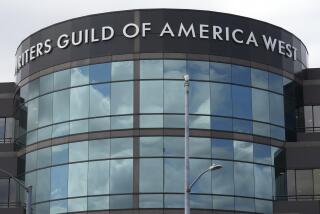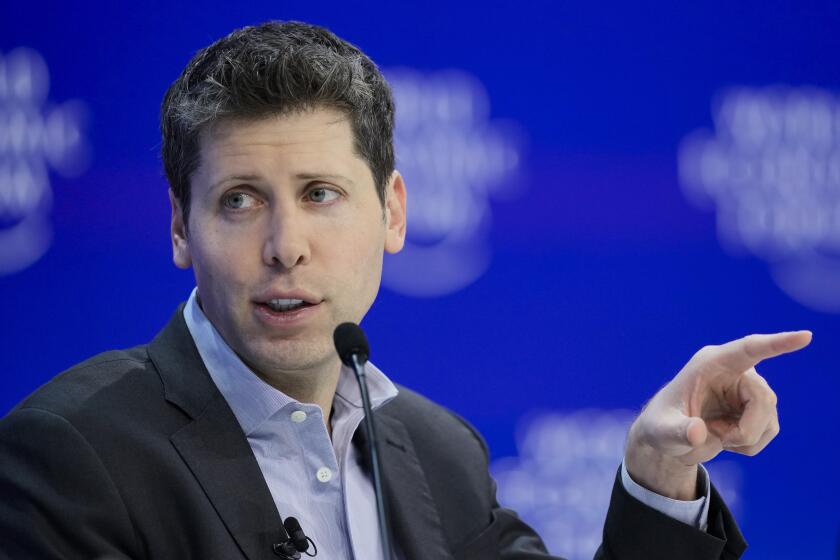WGA rejects WME’s latest offer to settle agency fight

- Share via
Beverly Hills-based WME remains the only major talent agency to not reach a deal with the Writers Guild of America.
The WGA’s agency negotiating committee on Tuesday rejected WME’s latest proposal because it did not mitigate the union’s concerns about how WME’s parent company Endeavor manages its affiliated production company.
The guild believes that agencies should reduce their ownership to 20% or less, to prevent any conflicts of interest where agencies would put their business needs over those of their writer clients.
Three of the four biggest agencies have deals with the WGA to cap their ownership in affiliated production companies at 20%.
Earlier this month, Century City-based Creative Artists Agency said its investor TPG had placed its ownership stake in affiliated production company Wiip into a blind trust, where it will be reduced to 20% by a set date. If CAA does not divest its stake by the deadline, it will face penalties, including not being able to represent WGA writers. CAA and TPG have also agreed together not to own more than 20% of Wiip.
CAA says it’s reached a deal with the WGA nearly two years after writers fired their agents over concerns about packaging and affiliated production companies.
The WGA says the WME proposal does not take similar steps, with WME and its investor Silver Lake Partners possibly holding more than 20% of affiliated production company Endeavor Content. WME has not offered to place its ownership stake in a blind trust, nor agreed to penalties if it does not divest by the deadline, the union said.
“WME waited until every other agency in town found a way to partner with the Guild and return to the representation of writers,” WGA’s agency negotiating committee said in a letter to WGA members on Tuesday. “Having sat mostly on the sidelines for the past 20 months, there will be no ‘going last’ bonus for WME — no accommodation for the fact that they are the most conflicted of all agencies — no alterations to our existing deals that soften the protections that writers have fought for nearly two years to achieve.”
WME said in a statement that it is willing to engage with the WGA and learned that its recent proposal was rejected through the media rather than directly from the guild.
“There was no counter to our proposal, nor any offer to meet and engage,” WME said. “While we find this tactic unhelpful in reaching a resolution, we will persist in our efforts toward reaching a new franchise agreement.”
The agency has said it is willing to reduce its stake to 20% in Endeavor Content, but it has not come to an agreement with the union over the timing and how that will be done.
Part of the challenge is that Endeavor Content is much larger than the other talent agency-affiliated production companies. Endeavor Content has invested in, developed or put into production more than 200 projects in the past year, including the BBC America drama “Killing Eve.”
Endeavor Content is part of the larger company’s aggressive and controversial strategy to expand beyond traditional deal-making into owning content.
WME has been in a dispute with the WGA for nearly two years, after thousands of writers fired their agents over concerns on practices such as charging packaging fees and having affiliated production companies.
The boycott has hit WME hard. The company said that it had received termination letters from more than 1,000 writer clients and that it was concerned about the long-term effects on its business, which has already been hurt by the pandemic. In May, WME implemented cost reductions, including layoffs, furloughs and reduced work hours that affected 20% of its staff.
Some agents have left to start their own management firms, heightening concerns that writer clients are using managers to replace the work of talent agencies.
The WGA bars its members from working with WME for writer representation services until the two organizations reach a deal.
Both WME and the WGA remain in a legal battle. Earlier this month, WME requested a preliminary injunction that would stop the WGA from barring writers from working with the talent agency during the lawsuit. On Wednesday, federal court Judge André Birotte Jr. denied the request, saying the court did not have jurisdiction to issue an injunction because it involves a labor issue.
At a hearing earlier this month, the judge urged both sides to come to an agreement.
“Find a path to try to resolve this,” Birotte said. “Real people are paying a price during this dispute.”
More to Read
Inside the business of entertainment
The Wide Shot brings you news, analysis and insights on everything from streaming wars to production — and what it all means for the future.
You may occasionally receive promotional content from the Los Angeles Times.












